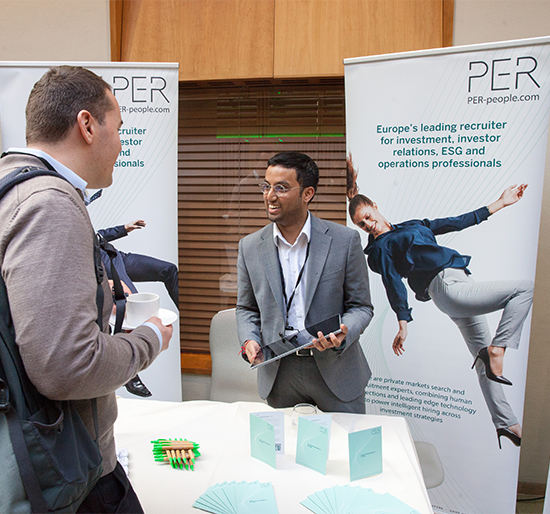The annual ESG conference, co-hosted by Real Deals and The Drawdown, took place in January this year at The King's Fund in London.
Panels, workshops and discussions revolved around value creation within the private markets, covering diverse areas such as regulation, data and talent.
The PER team was on hand to provide our unique views on compensation, employee retention and recruiting talent ready for the rigours of the private markets.
A key question that arose during the conference was that of bringing in a dedicated ESG professional versus continuing to consult external expertise to manage the increasing ESG workload facing private market firms of all sizes. The slight consensus was that a combination of the two was the best approach: although firms can rely on trusted external consultants for specific tasks and projects, to ensure that an ESG strategy is implemented effectively and consistently it was agreed that there is a need for an internal professional to guide and direct the efforts of both the consultants and the teams across the firm.
2. The importance of case studies as a recruitment tool

PER led the panel on compensation and recruiting ESG professionals into the private markets. During this discussion, a key topic that emerged was the importance of having a rigorous and challenging process that allows the hiring team to get a comprehensive picture of a candidate’s skills, experience, and levels of resilience. The use of case studies as part of the recruitment process is becoming more common, and allows the hiring team to test prospective employees with situations and tasks that mimic real life. Using case studies, firms are able to assess expertise and, more importantly, resilience, composure under pressure and time management.
3. Diversity of background – looking beyond traditional sources of talent
Throughout the panel discussions, case studies, and workshops (led by various leaders in ESG within the private markets), the importance of having a team with diverse professional backgrounds was clear. Individuals who work with the range of stakeholders and portfolio companies involved in private market ESG discussed how experiences in other industries and roles have informed and guided their ability to implement lasting ESG and sustainability-related initiatives. The panellists discussed the value of engaging with prospective candidates, from organisations within the same industries that a GP invests in, who can apply valuable industry insights to the ESG strategy of the GP.
Read the Real Deals summary of our panel conversation
4. Focus on commerciality and value creation
When listening to various ESG leads speak about how they contextualise their role with their firms, the key focus was on adding value through ESG. Framing their work through the value that they bring to portfolio companies allows them to communicate better with other teams within the firm. This framework also enables them to present tangible evidence of the effectiveness of ESG initiatives, as both risk mitigation measures and value creation with the potential to increase returns at exit.
5. Appreciation of appreciation
An important conclusion to draw from the conversations throughout the conference was the need for ESG professionals within firms to understand the financial impact of their decisions. ESG professionals have the potential to create positive and lasting impacts on the firms and portfolios, but these have to be built around a business case in order to be viable and to encourage buy-in from their colleagues and other stakeholders. By building their credibility with decision-makers across the firm, more ambitious and impactful initiatives can be put into practice, which can help support firms on a meaningful and sustainable ESG journey.

Author
Ashalan Pillay
PER
Ashalan Pillay
PER